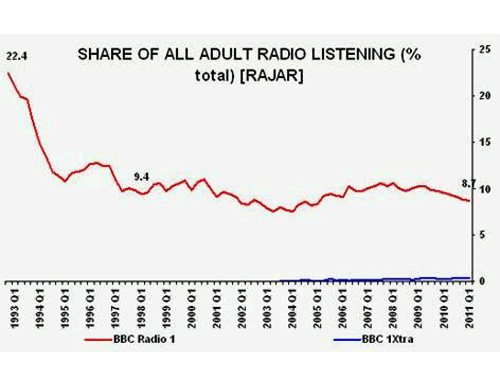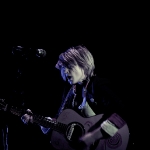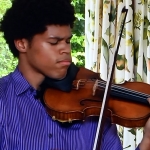“The Year The Music Died”
Personnel
Specific information on the salaries paid to radio ‘talent’ has been difficult to establish while the BBC insisted that this was commercially sensitive information and that going market rates were paid. Not even Government was allowed to know despite the BBC being a state-owned service. However, the BBC then changed its tune somewhat. This was the latest explanation via a talent report commissioned by the BBC Trust in 2008:
“Spending trends in network BBC radio are likely to be determined by factors other than commercial competition such as network radio spending growth, the relative audience priorities of the BBC and the opportunity costs of the lead DJs/presenters in terms of their willingness to work in radio when many of them also have TV careers*”
* “The BBC has maintained throughout this review that the payments it makes to top talent in network radio are driven more by that talent’s opportunity costs - and in particular their potential to work more in TV - than by competing bids friom rival commercial radio broadcasters.”
The BBC was forced to at least partially explain itself after newspapers published leaked details on the pay of some Radio DJs and presenters. Chris Moyles was shown to be earning over £600,000 per annum whilst others were earning from £70,000 (for limited broadcast hours) to over £250,000 a few years ago. It is rumoured that Moyles signed a new two-year contract in 2011 for $1.4million. He also hosts a comedy quiz show on BBC competing Channel 4 which is likely to earn him atleast further £250,000, along with Fearne Cotton who also appears on ITV 2’s Celebrity Juice. Other DJs/presenters also earn high amounts working outside the BBC.
The extraordinary high levels of BBC pay effectively operates to financially imprison staff who could not expect to earn anything close to these figures with other competing radio online/terrestrial employers. But there is also a more sinister result of this high pay policy… Individual personal skill and taste are replaced by a very corporate/prescriptive approach to presenting, especially in selecting music to play. Daytime presenters sound the same, a trend that’s even spread to ’specialist’ presenters during evening broadcasting. Music is, or should be, a highly creative endeavour but the BBC has effectively manacled presenters while heavily prescribing what music is played. And it’s costing the tax-payer much more each year.
A Monopolistic, National Network
BBC radio stations still represent the only real national network on the dial with this monopolistic situation guaranteeing substantial/leading national audience figures way in excess of its competitors, by as much as 10-1 (BBC Radio 1 - nearly 12 million lsteners, BBC Radio 2 - 14.5 million listeners). The result is that the BBC is highly influential in determining what music is heard and not heard, what sells and what music doesn’t sell. This also means that the BBC is open to receiving priority treatment from record companies keen to see their act/music playlisted. This translates into such things as release ‘exclusives’ and free live performances. The payback for record companies and publishers goes beyond record sales as broadcast music also earns fees. For example, BBC Radio 1’s content cost for 2010-2011 was £36.7 million - by far its greatest cost. Radio 2’s content cost nearly £48 million! Compare this with the content costs of smaller audience BBC stations such as 6 Music (££7.3 million) and BBC 1Xtra (£7.4 million).

BBC Playlist Policy
High quality Music art is badly served by the BBC due to its heavily prescribed playlist policy which effectively dominates daytime airplay - daily and hourly. The A, B and C playlists receive from a minimum of 20 plays per week to 5 per week over many months. Presenters have little say in what is played and are effectively expensive mouthpieces encouraging money-earning listener texting while strongly selling music and other shows/presenters. Name any act that has succeeded and behind it lies heavy BBC airplay. It may be just one song from an album that breaks the act (such as Snow Patrol or Coldplay or Jessie J, etc. etc.) or it could be several singles from the latest album (Sheeran, Adele, Florence, Jessie J, Gaga etc. etc.) which generates high sales spread over periods of a year and more. Commercial stations are often influenced by the BBC’s playlist and therefore these ‘lucky’ acts can secure hundreds of plays each week.
But playlists also mean that many great acts and their music are ignored (signed and unsigned, new and established acts) with the result that they struggle for recognition and necessary sales. Instead one is subject to a steady daily diet of the most mediocre music that sounds the same from acts whose sales and airplay are dramatically out of proportion to their talent. The BBC exhibits bias in its playlist selections favouring certain acts above others. This top-down influence by senior management is responsible for great and criminal injustice, favouring the strong over the weak. An example is the heavy promotion of Ed Sheeran and total ignorence of our album of the year by David J. Roch. One basks in high sales and recognition, while the better artist and music goes unseen and unheard. This is just one small example of the injustice and dishonesty of the BBC’s playlist policy.
Ask the questions: How many top albums of 2011 selected by the UK online and print media were actually played on the BBC? How much airplay did Mercury Barclaycard Prize-winner PJ Harvey secure on BBC Radio 1 and 2? She also topped several album of the year lists in the UK and USA. The British public pay heavily for services that are free from all other providers and should be guaranteed a quality and unbiased service. It is currently not fit for purpose and does not comply with its public service remit where modern music is concerned.
“I want to slag off all the people in charge of radio stations. Firstly, Radio One. They outlawed the pirates and then didn’t, as they promised, cater for the market the pirates created. Radio One and Two, most afternoons, run concurrently and the whole thing has slid right back to where it was before the pirates happened. They’ve totally fucked it. There’s no radio station for young people any more. It’s all down to housewives and trendies in Islington. They’re killing the country by having that play list monopoly.”
— Joe Strummer
|
|

|

Wallis Bird |
LATEST GALLERY IMAGES

Where Israel Goes, Misery Follows 
The Kanneh-Masons |
|
|



